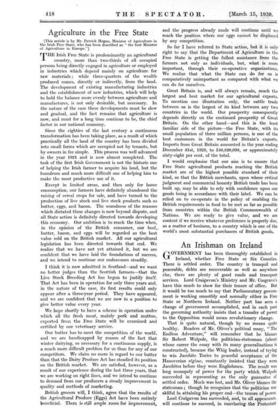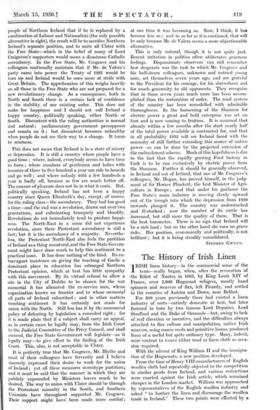An Irishman on Ireland
GOVERNMENT has been thoroughly established in Ireland, whether Free State or Six Counties. There is settled order. The country is tranquil and peaceable, debts are recoverable as well as anywhere else, there are plenty of good roads and transport services. Lord Craigavon's Ministry and Mr. Cosgrave's have this much to show for their tenure of office. But it would be too much to say that Parliamentary govern- ment is working smoothly and normally either in Free State or Northern Ireland. Neither part has seen a change of government accomplished, and in each part the governing authority insists that a transfer of power to the Opposition would mean revolutionary change.
That is quite natural, though by no means quite healthy. Readers of Mr. Oliver's political essay, " The Endless Adventure," will remember that he blames Sir Robert Walpole, the politician-statesman (about whose career the essay with its many generalizations is constructed), because the Whig leader, instead of trying to win Jacobite Tories to peaceful acceptance of the Hanoverian regime, constantly insisted that they were Jacobites before they were Englishmen. The result was long monopoly of power for the party which Walpole succeeded in representing as the only guarantee of settled order. Much was lost, and Mr. Oliver blames the statesman ; though he recognizes that the politician was skilful in attaining his proper end—the tenure of power.
Lord Craigavon has succeeded, and, to all appearance, will continue to succeed, in tonvincing- Protestant people of Northern Ireland that if he is replaced by a combination of Labour and Nationalists (the only possible alternative in sight), the result will be to sacrifice Northern Ireland's separate position, and to unite all Ulster with the Free State—which 'in the belief of many of Lord Craigavon's supporters would mean a disastrous Catholic ascendancy. In the Free State, Mr. Cosgrave and his colleagues- continually maintain that 'if Mr. de Valera's party came into power the Treaty of 1921 would be torn up and Ireland would be once more at strife with Great Britain. The apprehension of this weighs heavily on all those in the Free State who are not prepared for a new revolutionary change. As a consequence, both in North and South there is a certain lack of confidence in the stability of our existing order. This does not make for happiness and I should not call Ireland a happy country, politically speaking, either North or South. Discontent with the ruling authorities is normal and natural ; parliamentary government presupposes and counts on it ; but discontent becomes unhealthy when people do not see their way to a change. It turns to sourness.
This dOes not mean that Ireland is in a state Of misery or depression. It is still a country where people have a good time ; where, indeed, everybody seems to have time to burn ; where numbers of gentlemen and ladies with incomes of three to five hundred a year can ride to hounds and go well ; and where nobody with a few hundreds a year is badly off, because so few are much better off. The essence of pleasure does not lie in what it costs. But, politically speaking, Ireland has not been a happy country since Queen Elizabeth's day, except, of course, for the ruling class—the ascendancy. They had too good a time—and the end was a revolution, drawn out over two generations, and culminating brusquely and bloodily. Revolutions do not immediately tend to produce happi- ness. The North-East in a sense did not 'experience revolution, since there Protestant ascendancy is still a fact; but it is the ascendancy of a majority. Neverthe- less, the. Protestant North-East also feels the partition of Ireland as a thing unnatural, and the Free State Govern- ment might have done much to help this sentiment to a practical issue. It has done nothing of the kind. Its ex- travagant insistence on giving the teaching of Gaelic a dominant place in education has estranged Northern Protestant opinion, which at best has little sympathy with this movement.- By its virtual refusal to allow a site in the City of Dublin to be chosen for the war memorial it has alienated the ex-service men, whose organization knows no frontier and to whose memorial all parts of Ireland subscribed ; and in other matters touching sentiment it has certainly not made for union with the North. Still less has it by the announced policy of defeating by legislation a conceded right ; for it is made plain that if a subject shall carry an appeal, as in certain cases he legally may, from the Irish Court to the Judicial Committee of the Privy Council, and shall succeed, the Free State. Government will legislate—as it legally may—to give effect to the finding of the Irish Court. This, also, is not acceptable in Ulster.
It is-perfectly true that Mr. Cosgrave, Mr. Blythe and most of their colleagues have fervently and I believe sincerely expressed their desire to work for the union of Ireland ; yet all these measures stereotype partition; and it- must be- said- that the manner in which they are publicly expounded by Ministers -leaves much to be desired, The way to union- with Ulster should be through the Protestant minority in -the South, and Southern Unionists have throughout supported .Mr. Cosgrave. Their support might have_ been- made more cordial ; at one time it was becoming so. Now, I think, it has become less so ; and in so far as it is continued, that will be only because Mr. de Valera seems a more objectionable alternative.
This is only natural, though . it is not quite just. Recent irritation in .polities often obliterates generous feelings. Dispassionate observers can still remember how desperate was the task to which Mr. Cosgrave and his half-dozen colleagues, unknown and untried young -men, set themselves seven years ago, and are grateful to the President for his courage, for his shrewdness and for much generosity to old opponents. They recognize that in those seven years much more has been accom- plished than the restoration of order. The road system of the country has been remodelled with admirable thoroughness. In the harnessing of _ the Shannon for electric power a great and bold enterprise was set on foot and is now coming to fruition. It is assumed that already within a few months after the start nearly half of the total power available is contracted for, and that in all probability 1932 will see Ireland faced with the .necessity of still further extending this source of native power—as can be done by the projected extension of .the embankment scheme. Much of this hopefulnesS is due to the fact that the rapidly growing' Ford . factory in Cork is to be run exclusively by electric Power from the Shannon. Further it should be generally obServed, in Ireland and out of Ireland, that one of Mr. Coigrave's colleagues, Mr. Hogan, has proved himself, in the judg- ment of Sir Horace Plunkett, the -best Minister of Agri- _ .. culture in' Europe ; and that under his guidance the Free State's main" inthistry is Moving slowly upward out of the trough into which the depression from 1920 - `onwards plunged it. The country was understocked and ill-stocked ; now the • number Of its rattle has increased, but still more the quality of 'them. that is the best barometer. There is nO sign that Ireland will .
be a rich land ;- but on the other hand She 'runs no grave risks.. Her position, economically and politieally, -is' not brilliant.; but it is being steadily consolidated - • ' , .
. STEPHEN 'MV1iNN.





















































 Previous page
Previous page